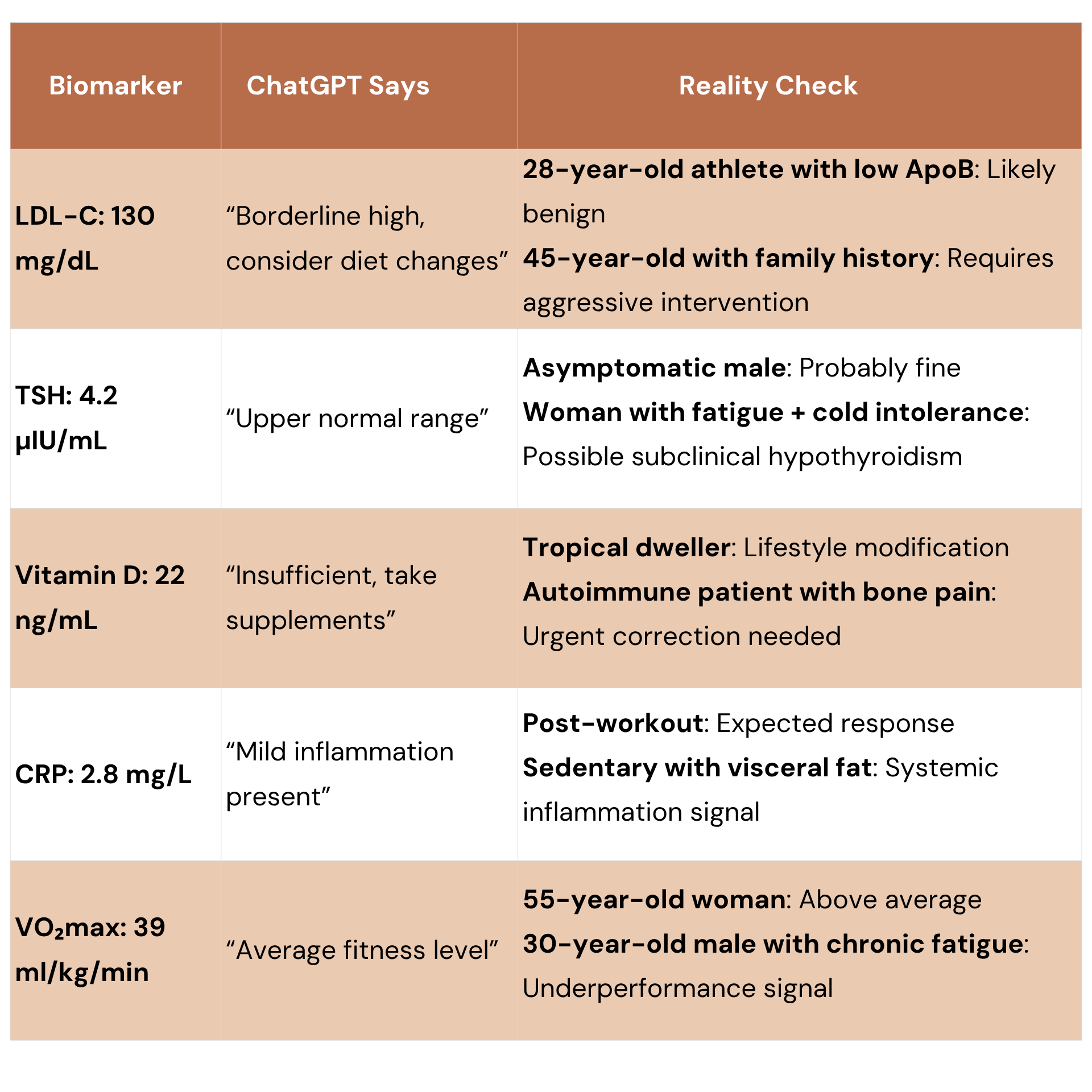Your numbers tell a story. But only when someone knows how to read it.
It’s 9 PM. Your blood test results just dropped into your patient portal. Your doctor won’t see you until next week, but that HbA1c number is staring back at you. 4.8%. Is that good? Bad? Should you panic?
So you do what nearly half of people now do: copy-paste your results into ChatGPT, hoping for clarity. And ChatGPT delivers. It explains that 4.8% indicates “good glycemic control” and suggests “maintaining a balanced diet and regular exercise.” You feel reassured. Problem solved.
Except it’s not.
What ChatGPT didn’t know — couldn’t know — is that you’re logging 65 kilometres every week as a runner. For someone with your activity level, that 4.8% might signal an underlying metabolic inefficiency worth investigating. Or maybe you’ve been dragging through afternoons despite “normal” numbers.
Context changes everything. And context is exactly what generic AI can’t see.
What ChatGPT Can Do (And It’s Not Nothing)
Let’s be clear, we’re not anti-AI. ChatGPT has its place:
- It translates medical jargon. “Tortuous colon” sounds terrifying until you learn it just means more twists and turns than usual.
- It identifies outliers. Values outside standard ranges get flagged with basic explanations.
- It educates. General information about what hemoglobin does or why vitamin D matters.
But here’s where it gets dangerous: ChatGPT stops where personalised medicine begins.
The Context Problem: Your Health Isn’t Generic
The most critical flaw isn’t what ChatGPT gets wrong, it’s what it can’t possibly know. Your health exists in a web of personal context that no general AI can access:
- Your baseline trends over time
- Your lifestyle and stress patterns
- Your genetic predispositions
- Your medication interactions
- Your functional symptoms
- Your specific goals
Here’s how context completely changes interpretation:

ChatGPT treats each scenario identically. A human expert sees entirely different stories.
Surface-Level Interpretations + Isolated Analysis = Missed Connections
ChatGPT analyses your results in isolation, missing the interconnected story your biomarkers tell together. Real health optimisation requires understanding relationships:
- Iron deficiency without considering inflammation, vitamin C, or gut health often leads to ineffective supplementation
- Elevated glucose without continuous monitoring, meal timing, or stress patterns misses root causes
- Thyroid dysfunction without reverse T3, selenium, or autoimmune markers provides incomplete pictures
This fragmented approach leads to:
- Missed diagnoses requiring integrated analysis
- Unnecessary anxiety from flagging benign variations
- Ineffective interventions that don’t address root causes
The Trend Blindness: Your Health Trajectory Matters More Than Snapshots
ChatGPT has no memory of your health journey. It can’t track trends, identify patterns, or recognise meaningful changes.
A vitamin D level of 25 ng/mL means different things if:
- It’s your first test (establishing baseline)
- It dropped from 45 ng/mL (investigate causes)
- It rose from 15 ng/mL after supplementation (tracking progress)
- It’s been stable for years (individual variation)
Your trajectory often matters more than any single number. ChatGPT only sees the snapshot.
Generic Advice: The One-Size-Fits-None Problem
When ChatGPT offers recommendations, they’re predictably generic: "Eat a balanced diet, exercise regularly, get adequate sleep, manage stress."
This ignores:
- Your specific metabolic type and macronutrient responses
- Your training goals and recovery needs
- Your lifestyle constraints and realistic strategies
- Your symptom patterns and what actually needs addressing
- Your genetic variations affecting nutrient metabolism
It’s like getting the same prescription regardless of your condition: technically safe, practically useless.
The Supplement Trap: Close, But Not Close Enough
ChatGPT might suggest vitamin D for deficiency, but it can’t determine:
- Optimal form (D2 vs D3, dosing schedule)
- Cofactor requirements (K2, magnesium for utilization)
- Absorption considerations (gut health, meal timing)
- Individual dosing based on weight, genetics, current levels
- Interaction risks with medications or other supplements
- Monitoring protocols for safe optimization
The difference between generic supplementation and precision optimisation can mean the difference between wasted money and transformation.
What the Research Actually Shows
Recent studies confirm these risks:
- ChatGPT correctly analysed only 26-51% of complex lab scenarios
- Failed to identify conditions like anemia and high cholesterol requiring medical follow-up
- Missed obvious testing errors that professionals catch immediately
- Rarely recommended appropriate specialist consultation or additional testing
In one case study, ChatGPT overlooked blood work strongly indicating anemia; results that would prompt any competent physician to refer for further evaluation to prevent life-threatening complications.
The Right Role for AI in Health: Co-Pilot, Not Captain
We believe in AI’s potential, when deployed correctly.
The future isn’t AI replacing medical expertise. It’s AI amplifying human judgment through:
Purpose-Built Systems: AI trained on medical data, validated against clinical outcomes, designed for healthcare.
Integrated Analysis: Processing biomarkers + wearables + body composition + lifestyle for comprehensive portraits.
Expert Oversight: AI serving as co-pilot to domain experts, scaling knowledge and applying scrutiny.
Contextual Understanding: Systems that learn your baseline, track trends, understand your journey.
Personalised Protocols: Considering your goals, genetics, lifestyle, and response patterns.
At Resolute, we craft our journeys around one principle: AI should amplify human expertise, not replace it.
Our Centaur model combines:
- Purpose-Built AI: Trained specifically on health optimisation, not general internet content
- Full-Stack Integration: Biomarkers + wearables + body composition + lifestyle = complete health portrait
- Expert Oversight: Board-certified physicians and health scientists guide every recommendation
- Longitudinal Tracking: Your trajectory matters; that’s why we track trends, not just snapshots
- Risk Stratification: We distinguish Type 1 risks (life-threatening) from Type 2 risks (performance-limiting)
- Personalised Protocols: Based on your unique data, goals, and response patterns
- Evidence-Based Methods: Every intervention grounded in peer-reviewed research and clinical experience
The Bottom Line: Your Health Deserves More Than Generic AI
Your blood test results tell a story, but only when interpreted with the right context, expertise, and tools.
ChatGPT might help you understand what words mean. But it can’t understand what your numbers mean for you. The stakes are too high for shortcuts. Missed conditions, delayed interventions, and misguided self-treatment have lasting consequences. Choose tools built for purpose. When you need real health insights, use AI systems designed for health analysis, validated by medical experts, and capable of understanding your unique context.
Your health is not generic. Your analysis shouldn’t be either.
Ready to see what your body’s actually trying to tell you?
Stop guessing. Start with a Portrait of Your Health: a complete picture of your biology across 85+ biomarkers, designed to cut through the noise and focus on what will actually change what you do tomorrow.






